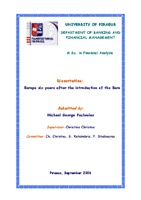| dc.description.abstractEN | The Economic Monetary Union and the creation of the euro is the most important institutional change in worldwide financial markets during the past quarter of the 20th century. The creation of an economic area with a single market and a single currency has been a unique endeavor in economic history. A single monetary policy over the euro-zone countries, due to the introduction of the euro has not been a failure, in contrast to the warnings of some critics. On the other side, the introduction of the common currency in the euro area countries has not launched a golden age of economic growth and flexibility, in contrast to some enthusiastic promises. The introduction of the euro results in the reduction or even elimination of some costs, because by moving from several national currencies to a common currency, as euro, some costs decline or even disappear. Among others, the advent of the single currency in the euro area contributes to the reduction of trading costs both directly and indirectly, by removing the exchange rate risk and the cost of currency hedging; it contributes, also, to the reduction of information costs. Furthermore, the introduction of the euro is enhancing price transparency and discouraging price discrimination; hence, it reduces market segmentation and is fostering competition. The common currency is encouraging foreign direct investments and precluding the possibility of future devaluation of national currencies. Consequently, the euro is playing a catalyzing role. | |



